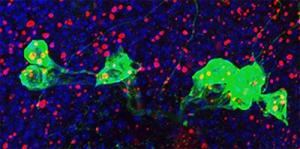NIH researchers rescue photoreceptors, prevent blindness in animal models of retinal degeneration
Using a novel patient-specific stem cell-based therapy, researchers at the National Eye Institute (NEI) prevented blindness in animal models of geographic atrophy, the advanced "dry" form of age-related macular degeneration (AMD), which is a leading...
Clinical Trial Testing Fecal Microbiota Transplant for Recurrent Diarrheal Disease Begins
A research consortium recently began enrolling patients in a clinical trial examining whether fecal microbiota transplantation (FMT) by enema—putting stool from a healthy donor in the colon of a recipient—is safe and can prevent recurrent Clostridium...
“Zero polio transmission and health for all”, WHO Director-General gives new year’s wish to the people of Afghanistan and Pakistan
WHO Director-General Dr Tedros Adhanom Ghebreyesus highlighted WHO’s commitment to the final push to eradicate polio on a 4-day visit to Afghanistan and Pakistan - the only two countries where wild poliovirus cases were reported last year. He also...
Gut microbes from healthy infants block milk allergy development in mice
New research suggests that the gut microbiome may help prevent the development of cow’s milk allergy. Scientists at the University of Chicago found that gut microbes from healthy human infant donors transplanted into mice protected animals exposed to...
The science is clear: with HIV, undetectable equals untransmittable
In recent years, an overwhelming body of clinical evidence has firmly established the HIV Undetectable = Untransmittable (U=U) concept as scientifically sound, say officials from the National Institutes of Health.
WHO Director-General concludes New Year visit to Ebola-affected areas in the Democratic Republic of the Congo
WHO Director-General Dr Tedros Adhanom Ghebreyesus traveled over the New Year to Ebola-affected areas in the Democratic Republic of the Congo (DRC) to review the response at this critical phase. Efforts to end the outbreak are continuing after recent...
NIH study implicates hyperactive immune system in aging brain disorders

In a study of flies, NIH scientists showed how the immune system may be a culprit in the damage caused by aging...
Better mouse model built to enable precision-medicine research for Alzheimer's
Incorporating genetic diversity into a mouse model of Alzheimer’s disease resulted in greater overlap with the genetic, molecular and clinical features of this pervasive human disease, according to a study funded by the National Institute on Aging (...
NIH-developed test detects protein associated with Alzheimer’s and CTE
An ultrasensitive test has been developed that detects a corrupted protein associated with Alzheimer’s disease and chronic traumatic encephalopathy (CTE), a condition found in athletes, military veterans, and others with a history of repetitive brain...
Study finds elevated risk of certain rare blood cancers after chemotherapy for most solid tumors
Findings from a new study by researchers at the National Cancer Institute (NCI) show that patients treated with chemotherapy for most solid tumors during 2000–2014 experienced an increased risk of therapy-related myelodysplastic syndrome/acute myeloid...






